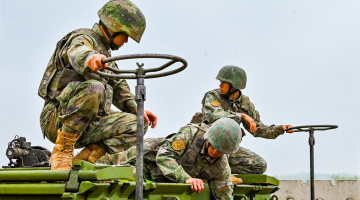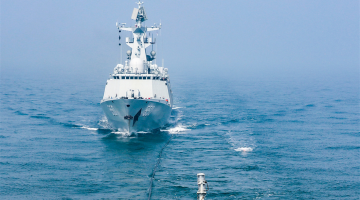
By Xiong Chaoran
Japan, the rotating chair of G7 in 2023, kicked off an intensive slew of diplomatic activities at the beginning of the year. Prime Minister Fumio Kishida visited France, Britain, Italy and Canada in succession, and his visit to the US -the highlight of all -captured worldwide attention. The series of foreign visits have yielded what can be called satisfactory results. In Europe, Japan and Britain signed the Reciprocal Access Agreement (RAA) allowing them to station troops in each other; in the US, Kishida was commended by Biden for the three Japan's defense documents newly revised at the end of last year.
Kishida gave himself a thumbs-up on his historical position when giving a speech at the Johns Hopkins University. “I am convinced that this decision represents one of the most historically critical milestones for strengthening the alliance, following such precedents as the conclusion of the Japan-U.S. Security Treaty by Prime Minister YOSHIDA Shigeru, the revision of the Treaty by Prime Minister KISHI Nobusuke, and the Legislation for Peace and Security by Prime Minister ABE Shinzo,” he said.
But both the Japan-UK defense agreement and the three newly revised Japan's defense documents have threatened regional peace and stability, being highly targeted on China. The recent moves by Japan have revealed its intention to break way from military restrictions in strides and it is colluding with the US on the military level at a higher frequency.
Why did Fumio Kishida visit the five countries right at the beginning of the new year?
What was Japan up to visiting so many G7 countries so intensively? What was Kishida’s top goal for visiting the US? Are Japan’s latest moves for military expansion ordered by the US or initiated by itself? As Japan is actually jeopardizing the political mutual trust it claims to want to increase, where is the China-Japan relationship heading going forward?
According to Da Zhigang, researcher at the Institute of Northeast Asian Studies at Heilongjiang Provincial Academy of Social Sciences and chief specialist at the Institute of Northeast Asian Strategies, since Japan is this year’s rotating chair in G7, it’s reasonable and customary for its prime minister to visit G7 members first, but Kishida’s choice of destinations revealed his focus on security and targeting third countries, with China being the primary target. Wherever he went, he went to great lengths to instigate hostility and criticism against China. Apart from the Russia-Ukraine conflict and the nuclear issue on the Korean peninsula, he laid more stress on hyping up the so-called “China threats” such as China’s growing activities in the Indo-Pacific region, the East China Sea and South China Sea issues, and the Taiwan question.
“This year is critical for Japan to exert its international role and secure historical breakthroughs in the security domain. Kishida hopes to consolidate the security relationship with Europe and use this exotic element to influence the situation in Asia or Indo-Pacific, and even to balance the Europe-US-Japan relations,” said Da. Giving Japan’s reservations and concerns-more or less -over its security alliance with the US, bringing Europe into the picture at the right moment is giving itself some extra insurance.
This was Kishida’s first visit to Washington since he became prime minister in October 2021, which was like a dream come true considering the lengthy belatedness despite his repeated expression of the wish to make the trip in the past one year and more. In general, the visit to Washington still holds the pride of place in Kishida’s early-year foreign trips, and his greatest accomplishment during the meeting with US President Biden was introducing the revisions of the three defense documents.

Who wants to untie Japan’s hands in military expansion more, Washington to Tokyo?
As Da Zhigang sees it, the drastic revisions of Japan’s three national security documents have changed the overall background in the post-WWII world. On the macro level, Kishida’s top agenda for the US visit was still to consolidate bilateral alliance and push their security cooperation to be modernized. On the meso level, he hoped the “counterattack capabilities” Japan inserted into the security documents will be materialized with America’s support, which means he has to have America’s word on the purchase of Tomahawk cruise missile, intensified integrated military cooperation between the two countries, and military interactions and resource sharing. On the micro level, Kishida wanted to uplift bilateral sharing practices to cover such aspects as arsenal, fuel depot, wartime information, and command system.
Although Japan’s three new security strategy documents list China, Russia and DPRK as the top three threats, the contents about enhancing Japan’s so-called counterattack capabilities are more targeted at China. On the Taiwan question in particular, Kishida and Biden in their meeting continued to emphasize that an emergency in Taiwan would mean an emergency to Japan, said Da, who believed there is a high possibility that Japan may engage in the question directly alongside the US, an indication of its growing risk-taking tendency.
Japan has recently taken fast steps to free itself from military restrictions. Is that an instruction from the US or an initiative by Japan itself? Da’s analysis showed that the increasingly complicated Korean peninsular issue with its back and forth and the potential spillover effects from the Russia-Ukraine conflict have all given Japan the excuse to lift the ban on its right to collective defense and to reinforce its attack capabilities. This, Da said, could be viewed as Japan’s proactive move with explicit or implicit aiding and abetting from American and European forces.
Sha Qingqing, deputy director of the Historical Literature Center, Shanghai Library, pointed out that Kishida began tweaking Japan’s “exclusively defense-oriented strategy and raising defense and military budget last year, which is welcomed by the US because, proving less than able to truly and fully control the Asian Pacific region, Washington looks to Japan to help fill some strategic blanks. We’ve seen both Secretary of State Blinken and President Biden applaud Japan’s shift of attitude.
China-US relationship is a key consideration in China-Japan relationship.
When Chinese and Japanese leaders met in Bangkok, Thailand last November, they reached a five-point consensus on stabilizing and developing bilateral relations, one of which was that the importance of their ties has not changed and will not change. Kishida went further to say that the two countries, as close neighbors, don’t pose threats to each other and should pursue peaceful co-existence. But for now, while stressing the need to increase political mutual trust, Japan has been destroying it by augmenting its defense capabilities. That’s something that should not be seen in the development of China-Japan relations.
“The regional arms race that will probably be set in motion by Japan’s military expansion will undoubtedly push regional economic cooperation to the back seat, erode mutual trust between the peoples, and increase enmity and hostility between the two countries. All of these will pose a new challenge to the development of China-Japan relationship,” said Da Zhigang. If Japan willingly assists in America’s diversified anti-China strategy, how can we expect it to pick up the initial aspiration when forging diplomatic ties with China 50 years ago? Its current moves are apparently detrimental to the stability and healthy development of the ties with China. Kishida’s claim that he wanted a constructive and stable bilateral relationship could only be credited when put into friendly and pragmatic practices.
Sha Qingqing noted that there was a time during Abe’s reign when the China-Japan relationship was on a healthy track and when Tokyo had doubts about the Trump administration’s policies. Abe’s utilitarian decision to engage with China in economy, trade and culture exchanges was more to “hedge against” the volatile Trump administration. As the Biden administration has implemented a pre-set Far Eastern policy that’s highly predictable, Japan, out of some historical habit, quickly climbed back to its subordinate position to the US, feeling quite comfortable there.
Many researchers hold that the China-Japan relationship is set in the broader context of China-US relationship, a situation that hasn’t changed since the 1970s, stressed Sha, saying that it’s hard to see any positive change in the former as long as the latter doesn’t fare well. Although the future of China-Japan relationship is anything but optimistic, one thing we must bear in mind -which is also what sets it apart from the China-US relationship -is that China and Japan are after all close neighbors of geographical proximity.
Editor's note: Originally published on guancha.cn, this article is translated from Chinese into English and edited by the China Military Online. The information and opinions in this article do not necessarily reflect the views of eng.chinamil.com.cn.









